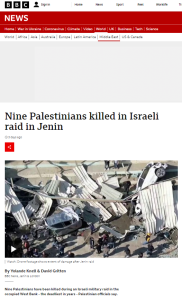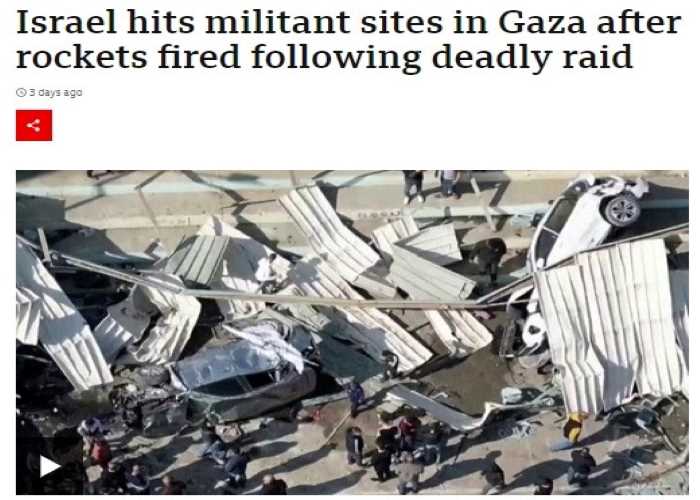As reported here earlier, in 2022 the BBC News website’s real time reporting of the firing of rockets at Israeli civilian communities by Gaza Strip based terrorist groups was confined to one month – August – during Operation Breaking Dawn.
On the night of January 26th – 27th three rounds of rockets were launched towards Israeli towns and villages by the Palestinian Islamic Jihad.
Just before midnight two missiles were fired towards Ashkelon and nearby communities, both of which were intercepted by the Iron Dome missile defence system. At around 03:30 three missiles were launched towards the Eshkol district, one of which was intercepted, one of which landed in an open area and one of which fell short in the Gaza Strip. Around 04:00 one rocket was launched at the Sha’ar HaNegev region and was intercepted.
A BBC News website report headlined ‘Nine Palestinians killed in Israeli raid in Jenin’ was last amended after 6 a.m. local time on the morning of January 27th. However it only mentions the first round of rocket fire:
“Overnight, Israel said it carried out airstrikes against Palestinian militants in Gaza after two rockets were fired into Israel. No group in Gaza has claimed responsibility for the rockets, both of which were intercepted by Israeli air defence systems.”
Another report, by Raffi Berg, headlined ‘Israel hits militant sites in Gaza after rockets fired following deadly raid’ was published on the BBC News website’s ‘Middle East’ page several hours later on the afternoon of January 27th. Readers are told of two of the three rounds of rocket attacks and the report was subsequently updated to include the PIJ’s admission of responsibility:
“Six rockets were fired, reports from Israel say, with Israel attacking what it said were militant sites. […]
Two rockets were fired around midnight (22:00 GMT Thursday) but were intercepted by Israel’s anti-rocket Iron Dome system, the Israel Defense Forces (IDF) said. Air strikes swiftly followed, targeting what the IDF said was an “underground rocket manufacturing site” in the central Gaza Strip belonging to the Islamist militant group Hamas, which governs the territory.
A second salvo of rockets was fired hours later, landing in open ground, shot down or falling back down in Gaza, the military said. Israel subsequently hit a site which it said was “a significant centre of Hamas terrorist activities” in the northern Gaza Strip.
A leader of the militant Palestinian Islamic Jihad (PIJ) in Gaza said the group had fired the rockets, Reuters news agency reported. Israel’s policy is to hold Hamas responsible for all attacks from there.”
BBC editorial guidelines include a section titled ‘Managing Online Content’.
“13.3.22 At the time that editorial content is posted online, the editorial managers responsible for its creation should decide on a strategy for its management over time. They should consider how frequently pages need to be updated or how they are to be treated if they are not to be updated.
13.3.23 To avoid materially misleading users, it should normally be clear when the content they are accessing was first published and, where relevant, when it was last updated significantly.
Pages may be given a date stamp from the moment of publication and/or they may be labelled as archived with a banner stating that the page is no longer being updated.
13.3.24 When a material change is made to content, the change should normally be indicated to users unless there are, exceptionally, reasons, including legal or editorial, not to do so.
13.3.25 The archive of the BBC’s online content is a permanent public record and its existence is in the public interest. The online archive, particularly news reports, should not normally be removed or amended.”
Those decidedly vague and inconsistent instructions lead to situations such as the one above in which audiences accessing one report which currently bears the vague date stamp “4 days ago” are informed that two rockets were fired into Israel while another report published just hours later and currently carrying the date stamp “3 days ago” correctly states that six rockets were fired. As usual, no link to the second, more up to date, report has been added to the first one in order to avoid audience confusion.
Roughly a week after a report appears on the BBC News website, the date stamp changes from “x days ago” to the actual date (but not time) of initial publication but no indications are given regarding subsequent significant updates. By contrast, many other online media outlets clearly state at the top of their reports both the date and time of publication, together with the date and time of any updates.
The BBC could “avoid materially misleading users” by adopting that simple practice as well as by making sure that new information on a specific topic that is later reported in a separate article is added to earlier reports, for example as a link under the “more on this story” heading at the bottom of the article.
Related Articles:
BBC NEWS WEBSITE COVERAGE OF JENIN COUNTER-TERRORISM OPERATION






Why has Blinken come to Israel? To see for himself how there is no Palestinian party ready to even recognise Israel’s right to exist?